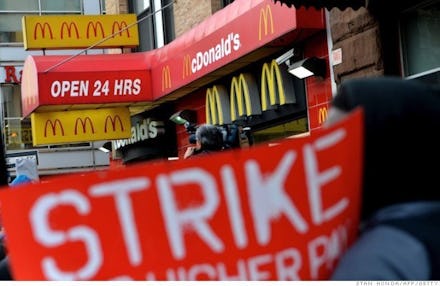A Major Fast Food Strike is Coming to 100 Cities This Week

The news: On Thursday, fast food workers in 100 cities across the United States will take part in a nationally organized strike, demanding wages of $15 an hour, more than double the current federal minimum wage at $7.25 an hour.
The strikes are largely backed by unions, particularly the Service Employees International Union, and spearheaded by groups like Fight for 15 in Chicago and Fast Food Forward in New York City.
The backstory: This is not the first time fast food workers have gone on strike this year. At the end of August this year, low-wage workers in 50 cities protested for a higher wage. The recent fast food worker movement stems back to November 2012, when 200 workers in more than 20 New York City restaurants staged a walkout, the first time ever for the industry.
Protests and rallies by and for low-wage workers are an increasing trend in the U.S., most recently with Walmart workers around the country protesting on Black Friday, asking for a $12.50 per hour wage.
Why this matters: Officials from the National Restaurant Association called the one-day fast food worker strikes “publicity stunts.” The fact that these protests are so easily brushed off by the industry is what makes them so necessary in the first place.
The fast food industry is a $200 billion business. McDonald’s CEO Jim Skinner earns almost $9 million each year – that’s more than 500 times what his low-wage employees bring home.
It’s at the point where instead of raising wages, McDonald’s recommends its employees sell their possessions on eBay or Craigslist for a little extra income this holiday season. While a low percentage of fast food workers earn the actual minimum wage of $7.25, most make barely more than that. The average fast food worker salary in New York City is a paltry $11,000 a year.
And this doesn’t simply affect the workers themselves. A study found that 52% of low-wage fast food workers receive some sort of assistance from the government, to the tune of more than $3.5 billion each year – a hefty price tag for taxpayers subsidizing the fast food industry’s reliance on low wages.
These protests aren’t simply about exploitative wages. There’s a severe psychological toll that comes with barely scraping by. On Thursday, fast food workers across the country are going to stand up for themselves and demand better. Maybe this time McDonald’s (and its ilk) will actually listen.